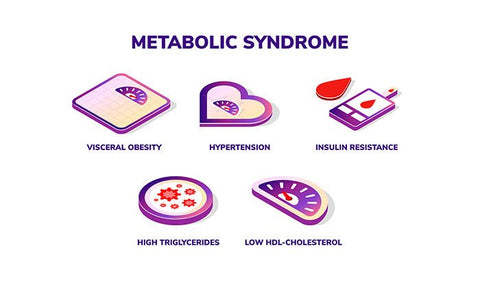Metabolic syndrome is a collection of metabolic disorders that significantly impacts your health, today and will greatly affect both the length and quality of your life. I will refer to Metabolic Syndrome as MSX.
To be clear, You didn't get MSX from your parents, your city didn't put it in the water or aliens did not supplant it in human DNA thousands of years ago, you know; to fatten up their crops.
It came from the foods you have been eating. No one made you pick those food choices, or did they? Maybe there is a bit of a conspiracy going on. Let's discuss it.
First let's define “conspiracy”. There is conspiracy fact and conspiracy theory. In science, everything is a theory until it is proven and then considered fact. Let's explore what we know as fact.
- There is proven evidence that the pharmaceutical, food manufactures and agricultural industries are closely tied together.
- Of all scientific studies conducted on human health is paid for by companies from these industries. And that makes sense. Studies are expensive, the money to perform them must come from somewhere, if the Government (paid by U.S. citizens) isn't paying for them. It also makes sense that these companies want to get a return on their investment. Which creates a strong, not guaranteed but very compelling motive to manipulate the study so that it benefits the company that is paying for it.
- There are many examples where industry has manipulated the findings of a study to say anything they want in order to benefit from the studies results. The tobacco industry is a perfect example. Where they withheld the dangers of smoking for decades all in pursuit of the dollar.
Nearly, everyday there is a study that comes out with a new theory. It's important to note that not all theories are conspiratorial. Most of them are honestly proposing a new idea of “how, when, where and why” of something is happening in the human body. Most researchers really do want to find the “truth”, regardless of what that truth is. The challenge is sifting through all the mire to find the golden nuggets and that's what WiO is trying to provide for you. My passion is helping you in the process of finding the golden health nuggets a little bit easier.
There are
However, with informed dietary choices, you’ll be able to take control and steer your health towards a brighter, healthier path.
In this blog, we'll delve into what metabolic syndrome entails, the critical role of diet in its management, and the specific foods that help mitigate its symptoms. From understanding the balance of nutrients to identifying foods to enjoy or avoid, we'll provide you with a comprehensive guide to eating smarter.
Whether you’re newly diagnosed, looking to prevent metabolic syndrome, or simply aiming for a healthier lifestyle, this guide is designed to empower you with knowledge and practical tips. So, let's embark on this journey of healthful eating and proactive lifestyle choices to manage metabolic syndrome effectively. 🍏💪🥗
What is metabolic syndrome?

Metabolic syndrome is a term you might be familiar with since it’s often mentioned in discussions about health and wellness. It's not a disease in itself but a group of risk factors. When these factors occur together, they greatly increase your chances of developing serious health issues like heart disease, diabetes, and stroke.
Metabolic syndrome symptoms include high blood pressure, elevated blood sugar levels, excess body fat around the waist, and abnormal cholesterol or triglyceride levels. These aren't merely individual health concerns; when they combine, they create a perfect storm that has the potential to put your overall health at serious risk.
It's essential to understand that metabolic syndrome is common and serious but also manageable. With lifestyle changes, particularly focusing on a healthier diet, regular physical activity, and weight management, you’ll effectively reduce these risk factors.
Doing so can turn the tide against metabolic syndrome and pave the way for a healthier, more vibrant life.
Principles of eating for a metabolic syndrome diet
Eating right for a metabolic syndrome diet involves adopting dietary principles that target its various components. Focusing on a diet that addresses these issues will improve or even reverse metabolic syndrome. Here are key dietary principles to consider:
Balance blood sugar levels
Opt for foods that have a low glycemic index (GI). These foods release glucose slowly into the bloodstream, preventing spikes in blood sugar. Examples include whole grains, legumes, and most fruits and vegetables.
Managing blood pressure
Reduce your salt intake, as it's directly linked to high blood pressure. Flavor your foods with herbs and spices instead. Include foods high in potassium, like bananas, spinach, and avocados, which help balance the effects of sodium and lower blood pressure.
Reduce waist fat
Focus on a diet that allows for modest, gradual weight loss. Reducing your caloric intake and increasing physical activity is key. Incorporate sources of monounsaturated and omega-3 fats, found in foods like olive oil, nuts, and fatty fish. These foods help reduce abdominal fat.
Improve cholesterol levels
Avoid high-fat meats, full-fat dairy products, and the trans fats found in many processed foods. Foods high in soluble fiber, such as oats, beans, and apples, help lower cholesterol levels.
Focus on whole, unprocessed foods
Eating foods in their most natural state ensures maximum nutrient intake and minimal added sugars, fats, and sodium. Don’t feel like you have to completely eliminate processed foods, but definitely moderate how much you eat and be sure to balance your diet with non-processed foods.
Regular, balanced meals
Eating at regular intervals helps regulate blood sugar levels and prevents overeating, which is essential for weight management.
Hydration
Adequate water intake is vital for overall health and aids in appetite control and metabolic function. It also keeps your body hydrated, a critical component for overall health.
Moderation and variety
A varied diet ensures a broader range of nutrients and prevents dietary boredom. Mixing up the foods you eat makes it more likely to stick to healthy eating in the long term.
By following these principles, you’ll manage the symptoms of metabolic syndrome and embark on a path to overall better health and well-being. It's about making conscious food choices that nourish your body and support your health goals.
Foods to include
Managing metabolic syndrome effectively involves incorporating foods that specifically target its risk factors. Here's a list of foods that are beneficial for managing metabolic syndrome:

- Leafy Greens and non-starchy vegetables:
These are high in vitamins, minerals, and fiber while being low in calories and carbohydrates. They help manage blood sugar levels and are beneficial for weight control. Examples include spinach, kale, broccoli, and bell peppers.
- Whole grains:
Whole grains like oats, quinoa, barley, and brown rice have a low glycemic index. As we discussed earlier, this means they release glucose slowly to prevent blood sugar spikes. They're also high in fiber, which helps lower cholesterol and improve blood sugar control.
- Fatty fish:
Salmon, mackerel, sardines, and trout are rich in omega-3 fatty acids and are known for their anti-inflammatory properties. Omega-3s help improve heart health by lowering triglycerides and blood pressure.
- Legumes:
Beans, lentils, and chickpeas are excellent sources of plant-based protein and soluble fiber. They help in managing blood sugar levels and are beneficial for weight loss and cholesterol management.
- Nuts and seeds:
Almonds, walnuts, flaxseeds, and chia seeds are packed with healthy fats, proteins, and fibers. They help in reducing LDL (bad) cholesterol and managing blood sugar levels, and their high fiber content aids in weight loss.
- Avocados:
Avocados are high in monounsaturated fats, so they help lower LDL cholesterol and are beneficial for heart health. They also provide fiber and essential nutrients that aid in overall metabolic health.
- Berries and low glycemic index fruits:
Blueberries, strawberries, and other berries are rich in antioxidants and fiber. They have a lower glycemic index compared to other fruits, making them suitable for blood sugar management.
- Dairy or plant-based alternatives:
Low-fat dairy products or plant-based alternatives like almond or soy milk provide calcium and protein. Choose unsweetened versions to avoid added sugars.
- Lean protein sources:
Chicken breast, turkey, and tofu provide essential proteins without the high saturated fat content of red meat. Proteins are crucial for satiety and muscle maintenance, especially important in weight management.
- Herbs and spices:
They add flavor without extra calories or sodium. Plus, spices like turmeric and cinnamon are noted for their anti-inflammatory and blood sugar-lowering effects.
- Extra virgin olive oil:
Extra virgin olive oil is a staple of the Mediterranean diet and known for its heart health benefits. It's high in monounsaturated fats and antioxidants. Olive oil is beneficial for cholesterol levels and overall heart health.
Incorporating these foods into your diet greatly assists in managing and improving the components of metabolic syndrome. Each food group brings unique benefits, from stabilizing blood sugar levels and managing cholesterol to aiding in weight loss and reducing inflammation.
Remember, variety and balance are key to a nutritious diet that supports long-term health and well-being.
Foods to avoid or limit
When managing metabolic syndrome, it's crucial to be aware of certain foods that will exacerbate its risk factors. Here’s a list of foods to avoid or limit, along with detailed explanations for each:

- Sugary beverages:
Drinks like soda, sweetened teas, and fruit juices are high in added sugars, which leads to spikes in blood sugar and contributes to weight gain and increased triglyceride levels.
- Refined carbohydrates:
White bread, white rice, pastries, and other refined carbs have a high glycemic index. They often cause rapid increases in blood sugar and insulin levels. This contributes to insulin resistance, which is a key component of metabolic syndrome.
- Processed meats:
Sausages, hot dogs, and processed deli meats are high in saturated fats and sodium. They are linked to an increased risk of heart disease and type 2 diabetes, both of which are associated with metabolic syndrome.
- Trans fats:
Found in some fried foods, baked goods, and processed snack foods, trans fats raise LDL (bad) cholesterol, lower HDL (good) cholesterol, and increase inflammation, aggravating the symptoms of metabolic syndrome.
- High-fat dairy products:
Full-fat milk, cheese, and butter contain high levels of saturated fats, which raise cholesterol levels and worsen heart health. Opting for low-fat or fat-free options is a great alternative to avoid these risks while still enjoying the same foods.
- Excessive alcohol:
While moderate alcohol consumption has some health benefits, excessive drinking leads to weight gain, increased triglycerides, and elevated blood pressure.
- High-sodium foods:
Excessive salt intake is linked to high blood pressure. Processed and canned foods often contain high levels of sodium.
- Fast food:
Often high in calories, unhealthy fats, sugars, and sodium, fast food contributes to obesity and worsens metabolic syndrome factors.
- Artificial sweeteners and sugar alcohols:
While they offer a low-calorie alternative to sugar, some artificial sweeteners and sugar alcohols disrupt gut health and potentially lead to glucose intolerance.
- Snack foods with added sugars:
Cookies, cakes, and candy bars are high in added sugars and unhealthy fats, contributing to weight gain and poor blood sugar control.
Understanding and limiting these foods significantly improves the symptoms of metabolic syndrome. It's crucial to make conscious dietary choices that support your health goals and contribute to overall well-being.
Remember, moderation is key. Occasional indulgences can be part of a balanced diet as long as they're managed within the context of your overall eating habits.
Lifestyle considerations
Improving metabolic syndrome involves more than dietary changes; it's a holistic approach that includes several key lifestyle considerations. Alongside making smarter food choices with options like WiO SmartFoods, incorporating these lifestyle changes will profoundly impact managing and improving metabolic syndrome:

- Regular physical activity:
Exercise is crucial in managing metabolic syndrome. It helps in weight loss, improves insulin sensitivity, and lowers blood pressure and cholesterol levels. Aim for at least 150 minutes of moderate aerobic activity or 75 minutes of vigorous activity each week, along with strength training exercises.
- Weight management:
Losing even a small percentage of body weight reduces the risks associated with metabolic syndrome. Focus on a sustainable approach to weight loss, involving both diet and exercise.
- Stress management:
Chronic stress exacerbates metabolic syndrome symptoms by affecting eating habits and hormone levels. Techniques such as mindfulness, meditation, yoga, or even simple breathing exercises are effective in managing stress.
- Adequate sleep:
Lack of sleep might lead to hormonal imbalances that promote hunger and weight gain. Aim for 7-9 hours of quality sleep per night, and maintain a consistent sleep schedule.
- Avoid smoking and limit alcohol:
Smoking and excessive alcohol consumption worsens the components of metabolic syndrome. Quitting smoking and limiting alcohol intake significantly improves your health profile.
Incorporating WiO SmartFoods into your lifestyle
WiO SmartFoods offers a range of products that seamlessly fit into a lifestyle aimed at managing metabolic syndrome. Here’s how we help:
- Low-carb options: WiO SmartFoods provides options that are low in carbohydrates, which is beneficial for controlling blood sugar levels and aiding in weight management, both of which are crucial for those with metabolic syndrome.
- Healthy fats: Many WiO products include healthy fats, which are essential for heart health and help manage cholesterol levels.
- High in fiber: Foods high in fiber are available, which are excellent for digestive health and help regulate blood sugar levels.
- Portion control: Our products often come in portion-controlled sizes, which assists in managing calorie intake for weight loss.
- Variety and taste: With a focus on flavor and variety, WiO SmartFoods makes it easier to stick to a health-conscious diet without feeling deprived.
By combining these lifestyle changes with a metabolic syndrome diet, you can effectively manage and improve the symptoms of metabolic syndrome. It’s about creating a balanced approach to your health that encompasses diet, physical activity, and overall wellness.
Embark on your journey to better manage metabolic syndrome with WiO SmartFoods. Our range of low-carb, high-fiber, and portion-controlled products is designed to complement your dietary needs while tantalizing your taste buds.
Explore WiO SmartFoods today and discover a delicious, convenient way to support your health goals. Get started today! 🌟🍽️🥗




